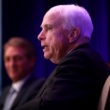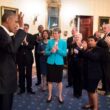“I Gave at the Office”—When former Christian Coalition leader Ralph Reed failed to show up at an Atlanta fundraiser he’d helped organize for John McCain, he was doing the senator a favor. McCain knows all about Reed’s role in the theft of $88 million from six Indian tribes between 2000 and 2002. Both men know that a photo of Reed standing beside McCain at a fundraiser would have been toxic.
As the new chair of the Senate Indian Affairs Committee in 2006, McCain inherited an ongoing investigation into the lobbying affairs of Jack Abramoff. The committee found that Reed was central to one of the most egregious frauds perpetrated by Abramoff: using money from a Louisiana Indian tribe to pay Reed to work secretly to shut down the Speaking Rock Casino of the Tiguas of El Paso—a million-dollar-plus payday for Reed.
As soon as the Tigua casino had been shuttered, Abramoff sold the Tigua Tribal Council a $4.2 million package to reopen it. The casino never did reopen, and the Tiguas quietly receded into the Stone Age poverty from which casino gambling had provided them a respite. That didn’t stop Abramoff from asking the Tiguas for an additional $100,000 to cover a trip for himself and Reed to Scotland’s legendary St. Andrews Golf Club. They had no compunction about the Indians’ paying their airfare, hotel, and greens fees. Golfing with Reed and Abramoff were former Ohio Congressman Bob Ney, White House procurement officer David Safavian, and Neil Volz, a former Ney aide working as a lobbyist. All but Reed would ultimately go to prison.
The perp walk to the table at McCain’s Indian Affairs hearings included many witnesses. Conspicuously absent was Reed. Also, Grover Norquist, whose group Americans for Tax Reform provided Abramoff with an account in which to hide at least $1 million, money that, when used in anti-gambling initiatives, could not be traced back to its source. (Norquist would take a small cut when he moved money for Abramoff.) Neither Reed nor Norquist was questioned about the scandal. Some Republican insiders are too big to confront in public.
The End of End Times—Five thousand people turned out for the Rev. John Hagee’s annual Citizens United for Israel conference in mid-July. This year Hagee, dropped by John McCain because of his anti-Catholic and anti-Semitic rants, toned down the End Times talk for which he is known. Hagee refused, for example, to answer a conference participant’s question about the timing of the Apocalypse. (He had told right-wing TV ranter Glenn Beck as recently as last year that the end of the world is upon us.) Hagee also muzzled conference participants, directing CUFI executive David Brog to tell folks to talk to no reporters unless Brog was present. Senator Joe Lieberman delivered the speech he had promised to give, before an embarrassed John McCain renounced Hagee. Lieberman said he didn’t agree with everything Hagee said, but that biblical heroes “are humans, great humans but with human failings.” Credit Jews on First for getting inside the convention with cameras to tell the story.
Obama Just Says No—Barack Obama continues to distance himself from his long-standing support for corn ethanol. Over the past few weeks, his campaign has purged from his website nearly all of his comments about ethanol. Last month the site boasted plans to “require 36 billion gallons of renewable fuels to be included in the fuel supply by 2022.” The site also warned that less than 10 percent of ethanol is coming from farmer-owned distilleries and promised that “Obama will create a number of incentives for local communities to invest in their biofuels refineries.”
All erased, and replaced with Obama’s new “Energy for America” plan, according to which the candidate will “require 60 billion gallons of advanced biofuels to be phased into our fuel supply by 2030.” During Obama’s August 4 speech announcing his new energy program, the word “ethanol” appeared just once, in a passing reference to “cellulosic ethanol,” a fuel that has yet to be produced in commercial quantities and may never be commercially viable.
Robert Bryce began asking the campaign for comments about ethanol for a story that ran in our June 15, 2007 issue. Despite numerous calls and e-mail requests, Bryce got no answer until early August, when he once again sought the candidate’s position on ethanol. “We are unable to grant your request,” campaign aid Moira Mack wrote back. Mack directed Bryce to Obama’s speeches and to his web page with the new energy plan.






0 Comments